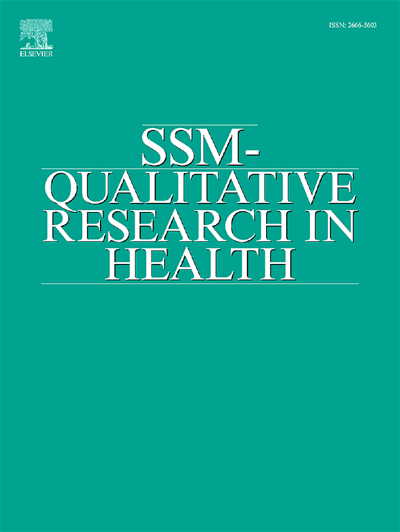Public Policy Polling 2024 Vermont Survey Results
This poll, which surveyed 539 registered voters in Vermont, was conducted by Public Policy Polling on September 4-5, 2024.
DSW Report Finds Strong Racial and Gender Biases in Prostitution and Trafficking Enforcement
April 15, 2022
DSW’s new report, “By the Numbers: New York’s Treatment of Sex Workers and Trafficking Survivors,” examined data that had not previously been examined in its totality. Our analysis demonstrates that racial and gender biases are as strong as ever and that the most damaging impacts of criminalization are suffered by communities with the greatest vulnerabilities. Frances Steele, research and policy coordinator and lead author of the report, submitted a commentary summarizing the report’s findings to The Crime Report. Read it here.

DSW Research and Policy Coordinator Frances Steele.
DSW Newsletter #35 (April 2022)
DSW Testified on Important Sex Work Bills in RI
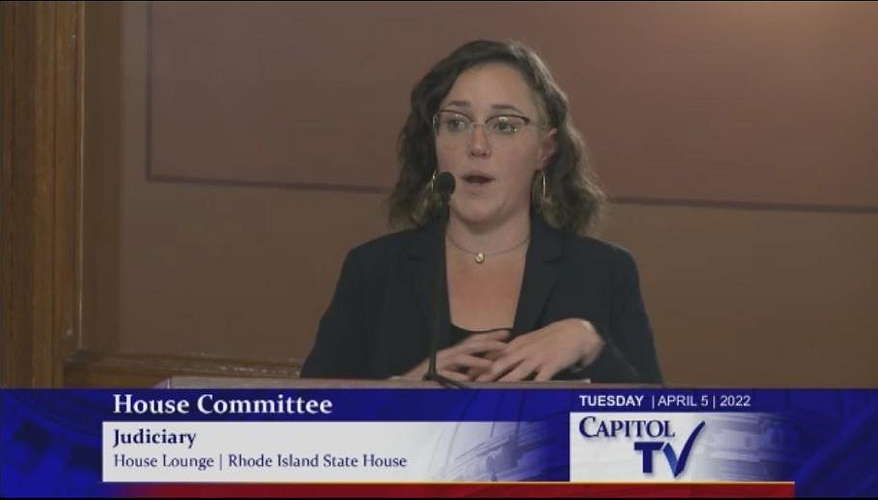
CO Quickly Advances the Safe Reporting Assaults Suffered by Sex Workers Act

DSW Report Finds Strong Racial and Gender Biases in Prostitution and Trafficking Enforcement

Oregon Sex Workers Committee’s Human Rights Commission
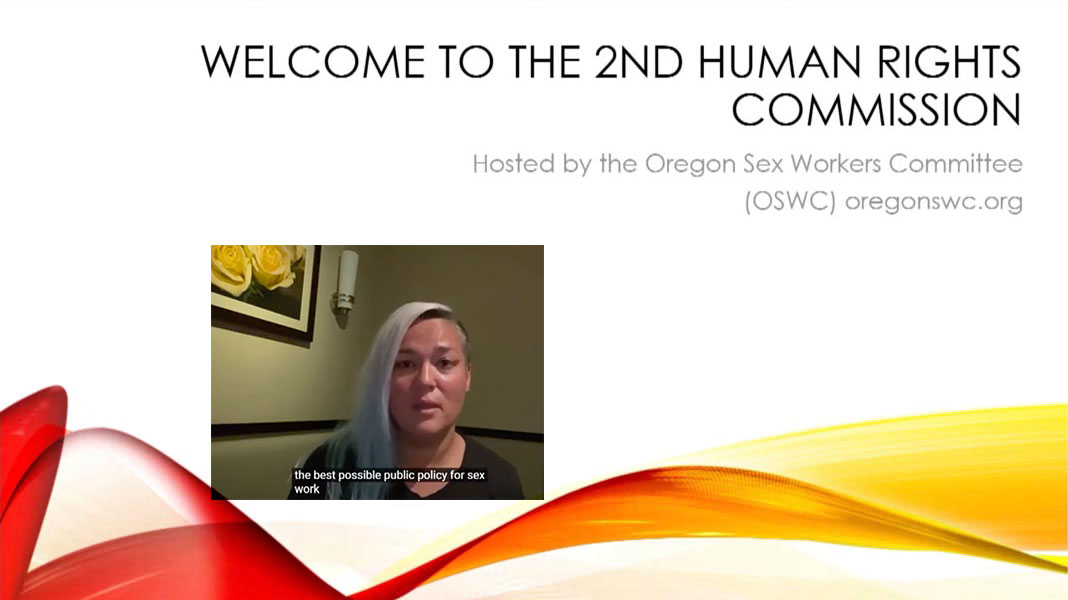
STI Awareness Month
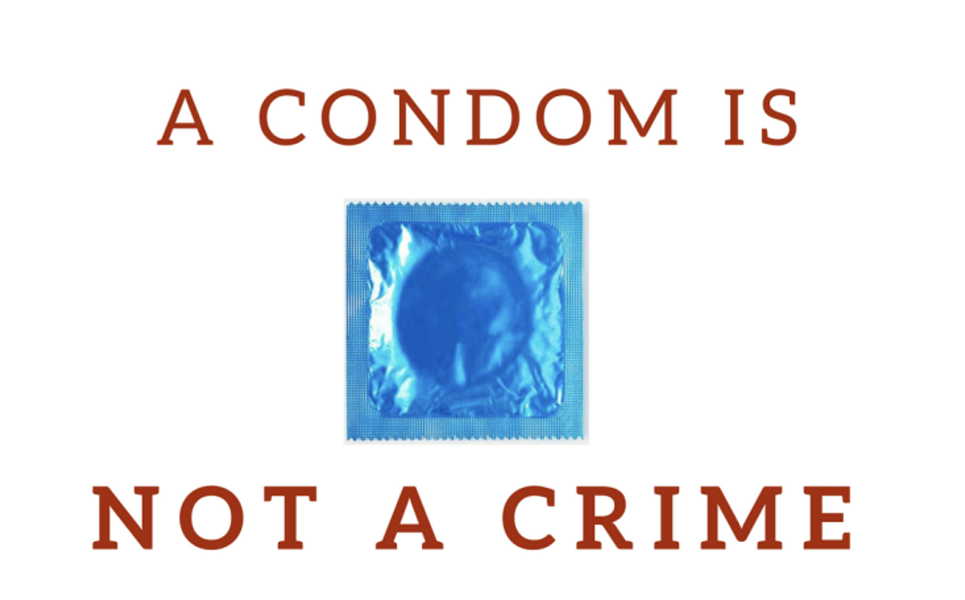
Save the Dates

DSW Newsletter Archive
Public Policy Polling 2022 Vermont Survey Results
This poll, which surveyed 616 registered voters in Vermont, was conducted by Public Policy Polling on January 17-18, 2022.
“What will we do if we get infected?” a qualitative interview-based study of the COVID-19 pandemic and its effects on the health and safety of sex workers in the United States
DSW Research and Project Manager J. Leigh Oshiro-Brantly co-authored and participated in all aspects of the study “What will we do if we get infected?” a qualitative interview-based study of the COVID-19 pandemic and its effects on the health and safety of sex workers in the United States (SSM – Qualitative Research in Health, online December 8, 2021)

J. Leigh Oshiro-Brantly
Over-Policing Sex Trafficking: How U.S. Law Enforcement Should Reform Operations
Over-Policing Sex Trafficking: How U.S. Law Enforcement Should Reform Operations (USC Gould School of Law’s International Human Rights Clinic, November 15, 2021)
Public Policy Polling 2021 National Survey Results
This poll, which surveyed 758 registered voters in the United States, was conducted by Public Policy Polling on September 30 and October 1, 2021.
The Equality Model
A guide to the Equality Model and the dangers of partial decriminalization prostitution laws

The Equality Model vs the Nordic Model of Prostitution
The term “Equality Model” has recently been attached to the legal framework more commonly known as the Nordic Model of Prostitution. Attaching the term “equality” to this approach to prostitution law suggests that it is in the best interest of sex workers. Unequivocal evidence shows that it is not.
Nordic Model prostitution laws partially decriminalize sex work while leaving both the purchase and promotion of sex work illegal.
At first glance, it may seem ironic to use the term “equality” to describe prostitution laws designed to criminalize one side of a sex work transaction. Given that implementing laws that criminalize clients clearly correlates with an increase in violence perpetrated against sex workers, perhaps the “equality” they’re referring to is how these laws equally harm everyone they touch.
In both implementation and outcomes, the Equality Model is anything but equal. Since police primarily use these laws to essentially entrap sex work clients, the Nordic Model rebranding we believe fits best is the “Entrapment Model.”
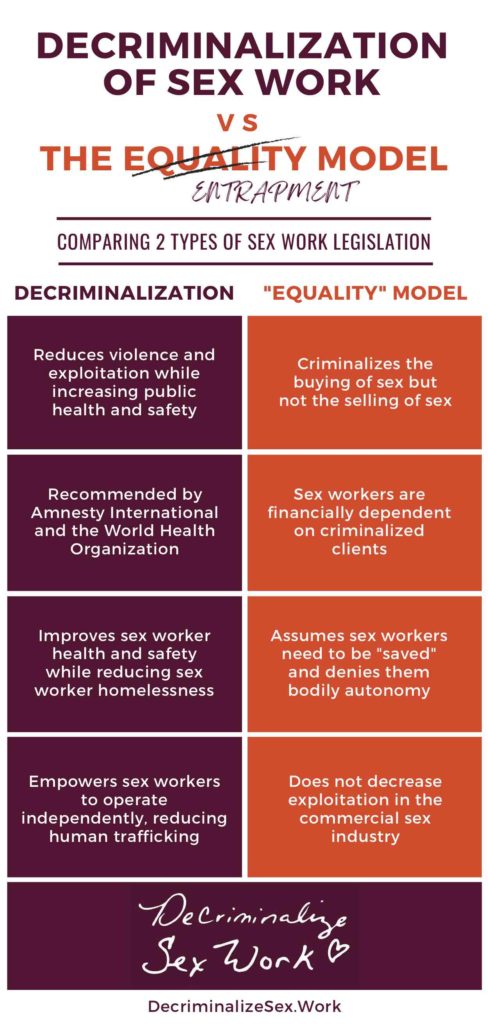
Decriminalization of Sex Work vs The Equality Model
We compare two types of sex work legislation: the full decriminalization of sex work and the equality model of prostitution legislation.
Decriminalization of Sex Work
- - Reduces violence and exploitation while increasing public health and safety
- - Recommended by Amnesty International and the World Health Organization
- - Improves sex worker health and safety while reducing sex worker homelessness
- - Empowers sex workers to operate independently, reducing human trafficking
The "Equality" Model
- - Criminalizes the buying of sex but not the selling of sex
- - Sex workers are financially dependent on criminalized clients
- - Assumes sex workers need to be "saved" and denies them bodily autonomy
- - Does not decrease exploitation in the commercial sex industry

What is the Nordic Model?
To fight the rebranding efforts of Equality Model proponents, it’s important to be ready with a quick reply when someone asks, “What is the Nordic Model?” Prostitution laws have an immediate and powerful impact on the lives of real people in our communities. To advocate for the human rights and safety of sex workers across the country, it is critical to understand the distinctions between different policies.
The Nordic Model of prostitution is based on the theory that the way to “free” sex workers from lives of prostitution is to criminalize clients and third parties. The theory assumes sex workers are victims, but in practice, the law tends to treat them more like criminals. Sex work exists on a spectrum of choice, circumstance, and coercion. Sex work is work and no one should assume that sex workers do not have choice or autonomy. This patriarchal view of sex work is a dangerous threat to the bodily autonomy and freedom of choice that women and other marginalized groups have been fighting to achieve for so long.
Laws based on the Nordic Model target sex work clients with entrapment, making them far more likely to pursue anonymous interactions in remote locations. Keeping sex work in the dark jeopardizes the harm reduction strategies sex workers use to keep themselves safe and leaves them vulnerable to predators and criminals.
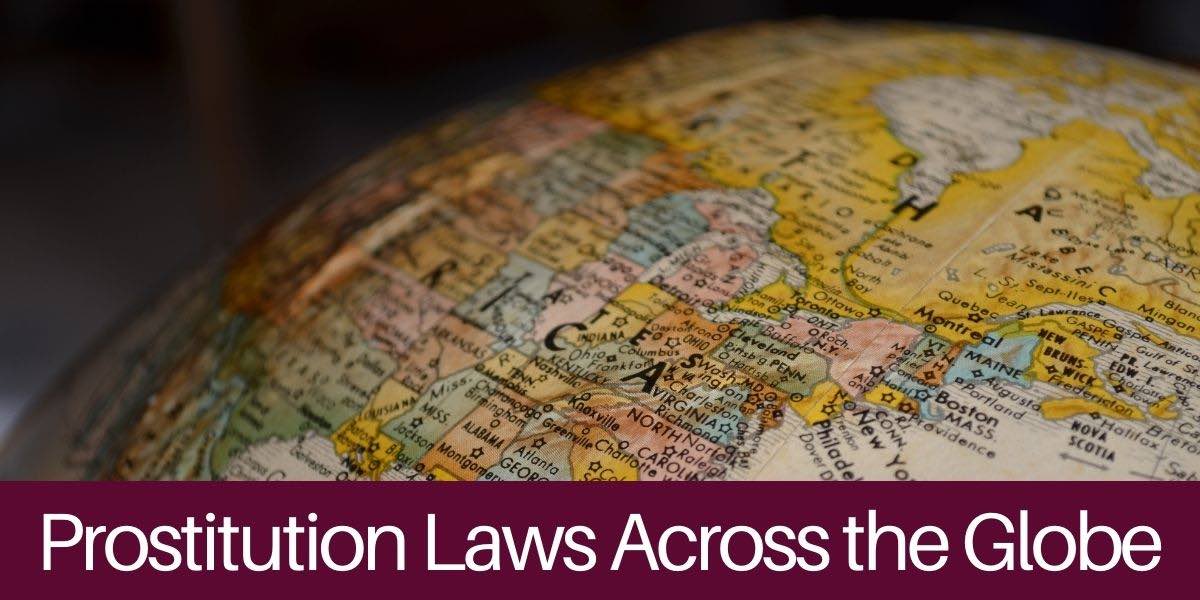
Prostitution Laws across the globe: Entrapment Model failures
From added violence to malicious evictions, evidence of Nordic model failure has shown that partial decriminalization prostitution laws are simultaneously ineffective at ending exploitation in the sex trade and harmful to the people they are meant to protect.
Northern Ireland created their Entrapment Model-like prostitution laws in a naive attempt to end demand for sex work. Rather than decrease demand, they’ve experienced an increase in online ads since implementation in 2015. A study conducted by the Department of Justice also found an increase in harassment and anti-social behaviors directed at sex workers since the policy change.
Norway enacted prostitution laws based on the Nordic Model that intentionally evicted over 400 sex workers, mostly migrant women, from their homes. The project was aptly named “Operation Homeless” by Norwegian police.
Swedish prostitution laws enacted in 1999 use landlords as weapons against sex workers. These laws hold landlords liable for promoting prostitution if they don’t evict sex workers simply for having used their homes to provide sexual services.

Equality Model New York
The promoters of the newly rebranded Equality Model of prostitution have launched their U.S. campaign in New York. Despite failing to reduce demand for erotic services or deter people from engaging in sex work, the Equality Model New York project has decided to push forward with their entrapment-focused legislation.
This Nordic Model offshoot has been rejected again and again by sex workers and in popular media.
EQUALITY MODEL MASSACHUSETTS
A legislative campaign has also launched with the goal of implementing the Equality Model in Massachusetts. The bill they have proposed is ironically called “An Act To Strengthen Justice and Support for Sex Trade Survivors." Unfortunately the implementation of legislation that criminalizes consensual sex work clients correlates with an increase in violence perpetrated against sex workers rather than a decrease in human trafficking.
This effort to implement the Nordic Model of prostitution in the Massachusetts uses fines charged to convicted sex work clients to fund programs meant to remove sex workers from the profession. Unfortunately the proponents of Equality Model Massachusetts seem to conflate victims of human trafficking and professional, consensual sex workers in their legislative proposal.
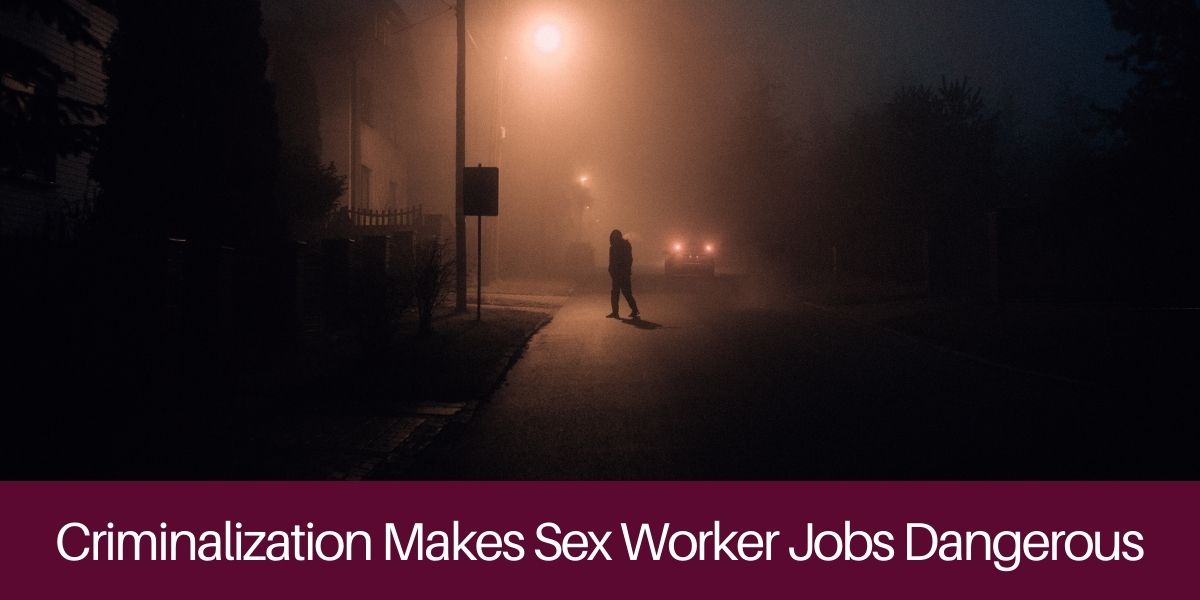
Sex worker jobs are not inherently dangerous. Criminalization makes the work dangerous.
Criminalizing clients keeps the entire sex work industry underground and makes sex worker jobs more dependent on third parties who might mean them harm, leaving them more vulnerable to exploitation.
Sex workers in countries where prostitution laws like the Entrapment Model have been implemented are frequently threatened and harassed by law enforcement. Criminalizing clients results in police raids on sex workers which are psychologically and physically harmful. These encounters also often result in sex workers experiencing isolation and stigma due to being outed to their community.
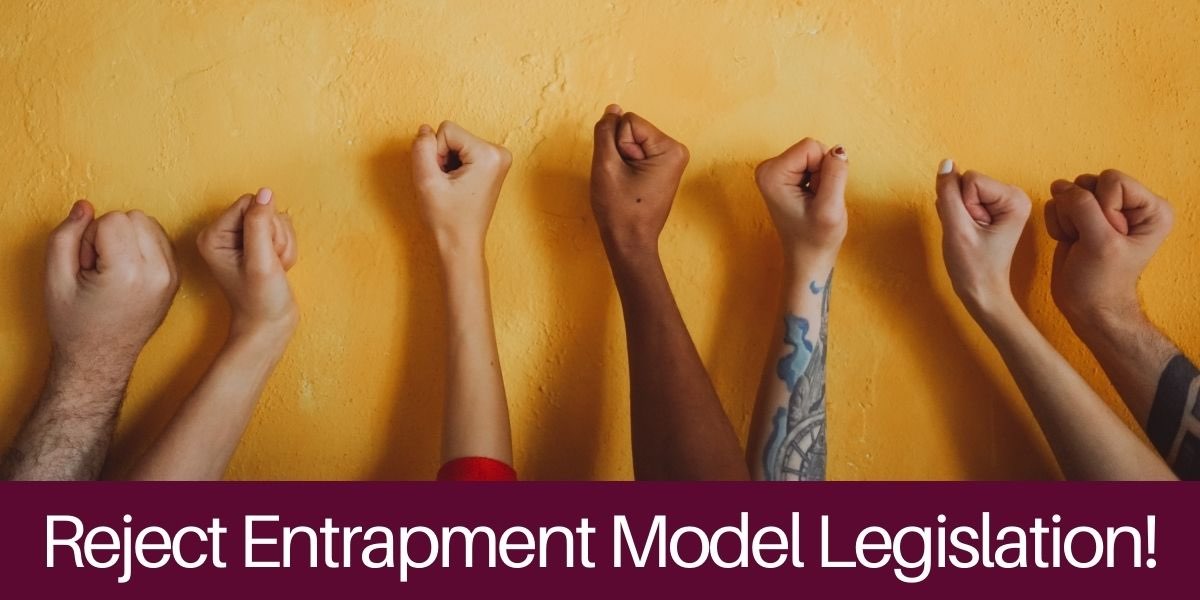
Take action! Tell your representative "I stand with sex workers near me and reject this new Entrapment Model legislation!"
Please send this letter to your State Representative and help reject the Entrapment Model before it gets a foothold in the United States. Your efforts will say "I stand with sex workers near me and reject this new Entrapment Model legislation!" With your support, we can fully decriminalize consensual adult sex work across the country and improve the health and safety of our communities.
Why Decriminalizing Sex Work Is Good Criminal Justice Policy
Too many people are incarcerated in the United States, and scarce resources are spent targeting victimless crimes.1 Tens of thousands of people are arrested annually for prostitution and related crimes. The majority of those arrested are adults who engage in consensual, victimless activities.2 Where sex work is decriminalized, law enforcement is able to focus resources on prosecuting human trafficking and other violent crimes.3
Those who are arrested and jailed for buying or selling sex face incarceration, fines, parole, and probation. They are likely to end up with permanent records that hinder future opportunities for employment, housing, and other necessities.4
Tough-on-crime policies lead to mass incarceration. Decades of tough-on-crime policies overcrowded American prisons with nonviolent offenders. The devastating consequences of the War on Drugs has prompted reform.5 It is time for laws criminalizing and marginalizing sex workers to see the same shift.
Save taxpayer money. Arresting people for consensual activities along with all of the additional costs after the arrest – jail, prosecution, probation, etc. – pose a significant burden to taxpayers.6 Yet, the criminalization of prostitution neither ends nor reduces it7; it solely pushes sex work into the underground market, where workers are unprotected from exploitation and abuse.
We know what prohibition does to markets. Alcohol prohibition failed to reduce demand and made alcohol more dangerous. The prohibition of drugs did the same. Laws have adapted to address these realities, replacing criminalization with harm-reduction policies. Combatting violence and abuse in sex work should be prioritized over arresting consensual adults.
Criminalizing sex work only amplifies the harms associated with it. Police, prosecutors and jails are ill-equipped to improve the lives of people who are arrested for trying to earn a living via prostitution.
Too often police abuse their powers and exploit or rape sex workers.8 Sex workers engaging in prostitution who are harmed by police officers have nowhere to turn for help. Decriminalization would empower sex workers and substantially reduce this abuse of power.
NOTES
1 The most recent FBI data from 2018 reported 24,944 arrests for “Prostitution and Commercialized Vice” https://crime-data-explorer.fr.cloud.gov/.
2 “Should Prostitution be a crime?” Emily Bazelon. May 5, 2016 https://www.nytimes.com/2016/05/08/magazine/should-prostitution-be-a-crime.html
3 “Decriminalising sex work in New Zealand: its history and impact.”Fraser Crichton. August 2015. https://www.opendemocracy.net/en/beyond-trafficking-and-slavery/decriminalising-sex-work-in-new-zealand-its-history-and-impact/
4 “Consequences of Policing Prostitution?” Dank, Yahner, & Yu. April 2017. https://www.urban.org/sites/default/files/publication/89451/legal_aid_final_0.pdf
5 “Public opinion favors criminal justice and drug policy reform, making now the time to act.” Legal Action Center. https://lac.org/public-opinion-favors-criminal-justice-and-drug-policy-reform-making-now-the-time-to-act/
6 “No Price Too High: Victimless Crimes and the Ninth Amendment” Charles Fyffe, Robert M. Hardaway. 2003.
7 Department of Justice Assessment of Review of Operation of Article 64A of the Sexual Offences Order (Northern Ireland) 2008: Offence of Purchasing Sexual Services. https://www.justice-ni.gov.uk/sites/default/files/publications/justice/assessment-of-impact-criminalisation-of-purchasing-sexual-services.pdf
8 “Arrest the Violence: Human Rights Violations Against Sex Workers in 11 Countries in Central and Eastern Europe and Central Asia” December 17, 2009. https://www.opensocietyfoundations.org/publications/arrest-violence-human-rights-violations-against-sex-workers-11-countries-central-and-eastern
Wisconsin Prostitution Laws
Is prostitution legal in Wisconsin?
Wisconsin prostitution laws make it a crime to pander, solicit, or engage another person in a sexual act in exchange for anything of value. All of those acts are misdemeanors across the state.
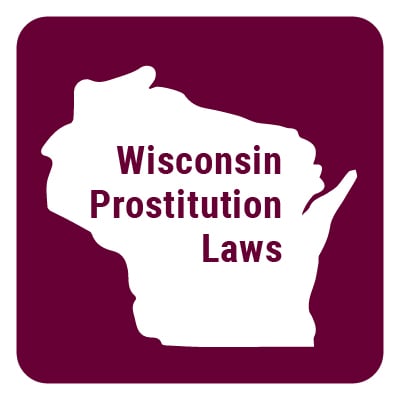
Prostitution Laws of Wisconsin
- 944.30: Prostitution
- 944.31: Patronizing prostitutes
- 944.32: Soliciting prostitutes
- 944.33: Pandering
- 944.34: Keeping place of prostitution
944.30: Prostitution
Any person who intentionally does any of the following is guilty of a Class A misdemeanor:
(1) Has or offers to have or requests to have nonmarital sexual intercourse for anything of value.
(2) Commits or offers to commit or requests to commit an act of sexual gratification, in public or in private, involving the sex organ of one person and the mouth or anus of another for anything of value.
(3) Is an inmate of a place of prostitution.
(4) Masturbates a person or offers to masturbate a person or requests to be masturbated by a person for anything of value.
(5) Commits or offers to commit or requests to commit an act of sexual contact for anything of value.
944.31: Patronizing prostitutes
Any person who enters or remains in any place of prostitution with intent to have nonmarital sexual intercourse or to commit an act of sexual gratification, in public or in private, involving the sex organ of one person and the mouth or anus of another, masturbation or sexual contact with a prostitute is guilty of a Class A misdemeanor.
944.32: Soliciting prostitutes
Except as provided under s.948.08, whoever intentionally solicits or causes any person to practice prostitution or establishes any person in a place of prostitution is guilty of a Class H felony.
944.33: Pandering
(1) Whoever does any of the following is guilty of a Class A misdemeanor:
(a) Solicits anotherto have nonmarital sexual intercourse or to commit an act of sexual gratification, in public or in private, involving the sex organ of one person and the mouth or anus of another, masturbation or sexual contact with a person the solicitor knows is a prostitute; or
(b) With intent to facilitate another in having nonmarital intercourse or committing an act of sexual gratification, in public or in private, involving the sex organ of one person and the mouth or anus of another, masturbation or sexual contact with a prostitute, directs or transports the person to a prostitute or directs or transports a prostitute to the person.
(2) If the person received compensation from the earnings of the prostitute, such person is guilty of a Class F felony.
(3) In a prosecution under this section, it is competent for the state to prove other similar acts by the accused for the purpose of showing the accused's intent and disposition. 944.34: Keeping place of prostitution Whoever intentionally does any of the following is guilty of a Class H felony:
(1) Keeps a place of prostitution; or
(2) Grants the use or allows the continued use of a place as a place of prostitution.

